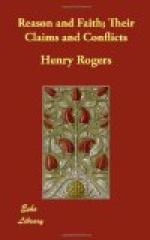Are the evidences, then, in behalf of Christianity less of a nature which man can appreciate? or can the difficulties involved in its reception be greater than in the preceding cases? If not, and if, moreover, while the evidence turns as before on principles with which we are familiar, the more formidable objections, as before, are such that we are not competent to decide upon their absolute insolubility, we see how man ought to act; that is, not to let his ignorance control his knowledge, but to let his reason accept the proofs which justify his faith, in accepting the difficulties. In no case is he, it appears, warranted to look for the certainty which shall exclude (whatever the triumphs of his reason) a gigantic exercise of his faith. Let us briefly consider a few of the evidences. And in order to give the statement a little novelty, we shall indicate the principal topics of evidence, not by enumerating what the advocate of Christianity believes in believing it to be true, but what the infidel must believe in believing it to be false. The a priori objection to Miracles we shall briefly touch afterwards.
First, then, in relation to the Miracles of the New Testament, whether they be supposed masterly frauds on men’s senses committed at the time and by the parties supposed in the records, or fictions (designed or accidental) subsequently fabricated—but still, in either case, undeniably successful and triumphant beyond all else in the history whether of fraud or fiction—the infidel must believe as follows: On the first hypothesis, he must believe that a vast number of apparent miracles—involving the most astounding phenomena—such as the instant restoration of the sick, blind, deaf, and lame, and the resurrection of the dead—performed in open day, amidst multitudes of malignant enemies—imposed alike on all, and triumphed at once over the strongest prejudices and the deepest enmity:—those who received them and those who rejected them differing only in the certainly not very trifling particular—as to whether they came from heaven or from hell. He must believe that those who were thus successful in this extraordinary conspiracy against men’s senses and against common sense, were Galilaean Jews, such as all history of the period represents them; ignorant, obscure, illiterate; and, above all, previously bigoted, like all their countrymen, to the very system, of which, together with all other religions on the earth, they modestly meditated the abrogation; he must believe that, appealing to these astounding frauds in the face both of Jews and Gentiles as an open evidence of the truth of a new revelation, and demanding on the strength of them that their countrymen should surrender a religion which they acknowledged to be divine, and that all other nations should abandon their scarcely less venerable systems of superstition, they rapidly succeeded in both these very probable adventures; and in a few years, though without arms,




